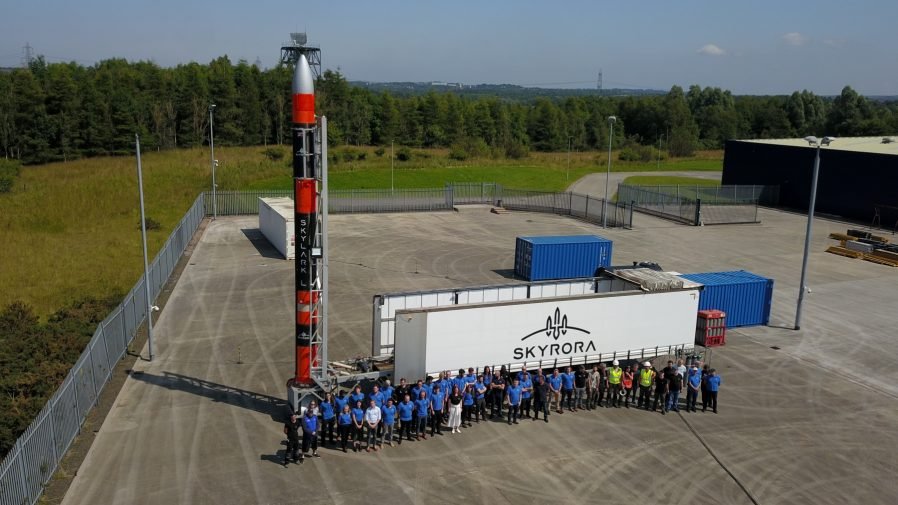
By Robert Scammell,
Published by UK Tech News, 28 December 2023
This year began with high hopes for the UK space tech sector, only for them to come crashing back down to Earth after the failure of Virgin Orbit to become the first orbital launch from British soil.
Despite that setback, there is optimism that the UK’s nascent but rapidly growing space tech sector will reach new heights in 2024. While the UK doesn’t yet launch rockets, spaceports in Scotland and Cornwall could change that in 2024. The UK also ranks third globally for space tech funding in a sign of the sector’s high potential.
Scottish rocket company Skyrora is one of several up-and-coming British firms with plans to launch in 2024. In the second half of 2024, NASA’s Artemis mission will see astronauts orbit the Moon for the first time in nearly 50 years, which is likely to renew global interest in the final frontier.
UKTN spoke to four space tech experts to find out their predictions for 2024.
Launch from British soil is ‘inevitable’
“2024 will be a landmark year for the space tech industry, especially in the UK. Not only is a launch from British soil inevitable, so is a general election. Whichever party wins power next year will determine how much emphasis will be placed on the space sector – will we see more funding? Changes to R&D? A stronger pipeline of skilled tech and engineering talent?
“The space industry generates billions of pounds and employs hundreds of thousands, as such, it is a key sector to get right for the future of the British economy and if the UK truly wants to cement itself as a science and technology superpower.
“The UK has a great pedigree in space tech and has always been a leader in manufacturing small satellites. But now Britain has made significant strides when it comes to regulations and launch capabilities. Next year we’ll see these efforts come to fruition with multiple launches from Scottish spaceports.”
– Volodymyr Levykin, CEO and founder, Skyrora
Decreasing cost to get to orbit will fuel space tech boom
“Manufacturing in microgravity is at a critical inflection point. Currently, the cost of returning mass to Earth is extremely expensive and in a lot of cases, is prohibitively high. In the same way that SpaceX’s decrease in launch costs induced the massive boom in the satellites industry, a decrease in the cost for return will cause a boom in in-orbit manufacturing – making critical life science research, novel drug production and superior semiconductor chips manufacture possible.
“Multiple returns vehicle technologies are coming online next year. The Exploration Company, Atmos Space Cargo and Space Forge are a few companies testing their differing technologies to safely return payloads back to Earth. This is a massive step to complete the needed infrastructure for this industry.
“As these companies naturally bring down the cost for return, the economics will shift, lowering the threshold as to what makes sense to produce in space. I expect to see many more microgravity application companies springing into life too! Bring on 2024!”
– Katie King, CEO and founder, BioOrbit
A shift to sustainable rocket fuels
“The technological landscape for 2024 is ripe with thrilling innovations. In particular, our industry’s decision to move away from traditional hazardous rocket fuels, through regulatory and sustainability initiatives; not only represents a significant step not only towards a sustainable space landscape, but also toward several fuel innovations that enable the extraction of resources from moons, asteroids, and Martian landscapes, and their conversion into fuel.
“The shift towards sustainable rocket fuels in 2024 heralds a new era of space exploration and technology. This transition is not just environmentally significant; it also opens up remarkable possibilities for the space industry. With the ability to extract and convert resources from moons, asteroids, and Martian landscapes into fuel, we’re looking at a future where space missions can be more self-sufficient. This could drastically reduce the cost and complexity of space travel, making it more accessible and frequent.”
– Ashley Modeste Johnson, CEO and founder, Applied Atomics
Generative AI will transform space tech
“Space, like many other industries, is full of siloed or internal information. GPTBuilder allows you to train a GPT on your own data, code-free. The code-free part is crucial, making the entire process shockingly fast. On my very first use of GPTBuilder, I built a satellite design requirements tool in, literally, five minutes.
“I trained my GPT on NASA design guides, pulled from their website. The tool developed satellite design requirements by asking me questions about my needs. It even talked me through design trade-offs and explained some of the consequences of my decisions, on everything from image resolution to radio frequency selection. It even quickly turned the list into a table to track requirements. Finally, the most impressive bit. I asked whether my old startup’s propulsion system would work in my satellite design, by uploading its datasheet. Reader – it got the answer right!
“Based on these results, GPTBuilder will transform any engineering discipline. Train it on better or proprietary data and you could have an exceptionally potent tool to speed up design. It’s hard to grasp how powerful GPTBuilder will be until you try it, so I encourage you to try it immediately on something for work to discover its potential.”
– Dr Maureen Haverty, principal, Seraphim
See: Original Article





